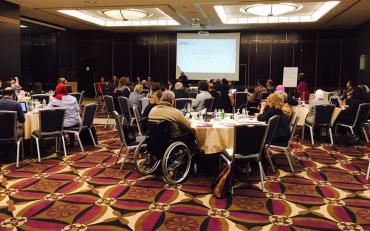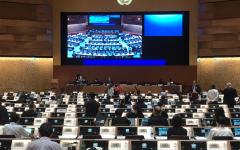*To read this information in Arabic, click here.
The Arab Organization of Persons with Disabilities (AOPD), in partnership with the Inter-Agency Standing Committee (IASC) Task Team on Inclusion of Persons with Disabilities in Humanitarian Action and the International Disability Alliance (co-chair of the Task Team), held a regional multi-stakeholder consultation for the Middle East and North Africa (MENA) Region in Beirut, Lebanon from 6 – 7 March 2018. The consultation was made possible through the support of the Governments of Finland, Luxembourg and Australia, as well as the European Commission Civil Protection and Humanitarian Aid Operations (ECHO).
The workshop was the second in a series of regional consultations supporting the development of the IASC Guidelines on Inclusion of Persons with Disabilities in Humanitarian Action (“the Guidelines”). Sixty participants, including organizations of persons with disabilities (DPOs), humanitarian and development stakeholders and governments based in the MENA region discussed priority areas and key components of the Guidelines, and shared feedback to ensure the Guidelines will be effective and relevant in the field.
The workshop aimed to:
- Share feedback on priority areas/key components for the Guidelines
- Obtain feedback from stakeholders on the level of details required for the Guidelines to be effective and relevant in the field
- Collect existing information, promising practices and other relevant information from participants to support the content development of the Guidelines
- Identify how regional humanitarian actors can contribute to phases of the Guidelines development process, including establishing appropriate feedback mechanisms.
The workshop began with a formal welcome from the Arab Organization of Persons with Disabilities (Mr. Abraham Abdallah, Chair of AOPD, and Mr. Nawaf Kabarra, Chair of the country representatives of AOPD) and a strong message that the region needs to move from an institutional to an inclusive and collaborative approach regarding persons with disabilities, particularly in situations of risk and humanitarian emergencies.
Mr. Fred Neto, UN Economic and Social Commission for West Asia (UN ESCWA) and Ms. Tanya Chapuisat, UNICEF Lebanon Country Director, emphasized the importance of the consultation as an opportunity to strengthen commitments to the inclusion of persons with disabilities in humanitarian action. They noted the importance of building meaningful participation of persons with disabilities in humanitarian action, and that it is critical to ensure that the Guidelines are practical and based on experiences from the ground.
The keynote speech was delivered by the Lebanese Minister for Social Affairs, Mr. Pierre bou Assi, who shared a clear message that the focus for all stakeholders must be on persons with disabilities, not only disability itself. He recognized the importance of harmonizing standards in humanitarian action in order to ensure persons with disabilities are not left behind.
The Guidelines will assist humanitarian actors, governments, affected communities and organizations of persons with disabilities to coordinate, plan, implement, monitor and evaluate essential actions that foster the effectiveness, appropriateness and efficiency of humanitarian action, resulting in the full and effective participation and inclusion of persons with disabilities and changing practice across all sectors and in all phases of humanitarian action.
- Read the full report from the MENA consultation
- Agenda of the IASC MENA Regional Consultation
- More information on the IASC Task Team and the future IASC Guidelines on Inclusion of Persons with Disabilities in Humanitarian Action
- Report from the first IASC regional consultation in the Pacific
- Read the article published by Lebanon’s National News Agency
- MENA consultation photo gallery


